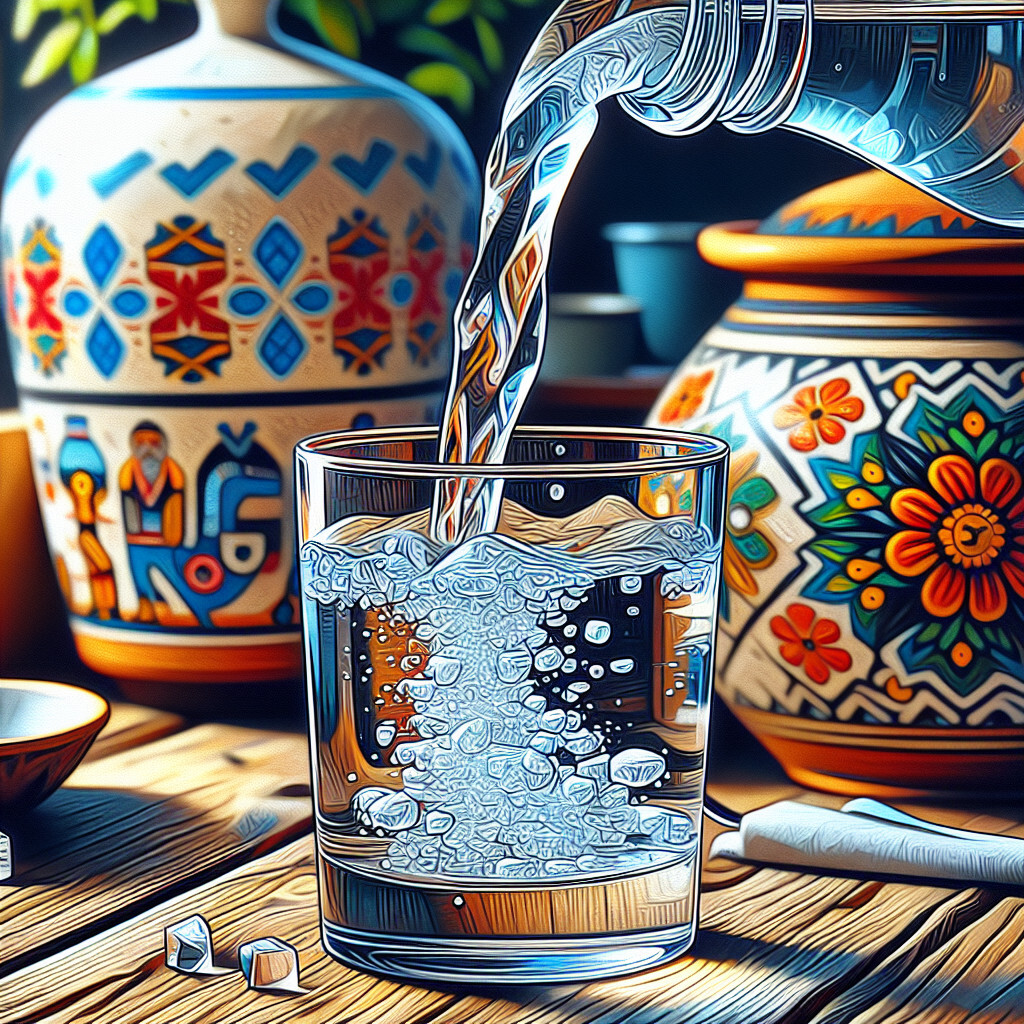-
Table of Contents
“Bulgaria’s Tap Water: Refreshingly Pure and Safe to Drink!”
Introduction

The tap water in Bulgaria varies in quality across different regions. In major cities like Sofia and Plovdiv, the tap water is generally safe to drink, undergoing regular testing and treatment to meet health standards. However, in some rural areas, the tap water may not be as reliable due to outdated infrastructure and lack of proper treatment facilities. It’s recommended for tourists to buy bottled water or boil tap water before consumption in these areas. The taste of the tap water can also differ based on the region due to varying mineral content.
Understanding the Quality of Tap Water in Bulgaria
Bulgaria, a beautiful country located in Southeastern Europe, is known for its rich history, diverse culture, and picturesque landscapes. However, one aspect that often raises questions among tourists and locals alike is the quality of its tap water. Understanding the quality of tap water in Bulgaria is crucial for both health and practical reasons.
Bulgaria’s tap water quality varies significantly across the country. In major cities like Sofia, Plovdiv, and Varna, the tap water is generally safe to drink. These cities have modern water treatment facilities that ensure the water is adequately purified before it reaches the taps of residents. The water in these urban areas meets the European Union’s stringent water quality standards, which include tests for harmful bacteria, viruses, and chemicals.
However, despite meeting these standards, some residents and visitors may still notice a distinct taste or smell in the tap water. This is primarily due to the chlorine used in the water treatment process. While this may be off-putting to some, it’s important to note that the presence of chlorine is not harmful. In fact, it’s a common method used worldwide to disinfect water and make it safe for consumption.
Transitioning from the urban to the rural areas, the quality of tap water can be quite different. In some remote regions of Bulgaria, the water infrastructure is outdated or insufficient. This can lead to issues with water quality, as the water may not be treated as thoroughly as it is in larger cities. In these areas, it’s often recommended to boil tap water before drinking or cooking with it, to ensure any potential harmful bacteria or viruses are killed.
Furthermore, in certain parts of the country, particularly in the Northwest, the tap water has been found to contain higher levels of certain minerals, such as iron and manganese. While these minerals are not harmful in small amounts, they can affect the taste of the water and may cause health issues if consumed in large quantities over a long period of time.
Despite these challenges, the Bulgarian government has been making concerted efforts to improve the country’s water infrastructure. With support from the European Union, numerous projects have been launched to modernize water treatment facilities and pipelines, particularly in rural areas. These initiatives aim to ensure that all residents of Bulgaria have access to clean, safe drinking water.
In conclusion, while the tap water in Bulgaria’s major cities is generally safe to drink, the quality can vary in rural areas due to outdated infrastructure and higher mineral content. Therefore, it’s advisable for visitors to Bulgaria to research the water quality in their specific destination. If in doubt, bottled water is widely available throughout the country and is a safe alternative. As for locals, they can look forward to continued improvements in the country’s water infrastructure, thanks to ongoing modernization efforts. Understanding the quality of tap water in Bulgaria is not just a matter of convenience, but also a crucial aspect of public health and wellbeing.
The Impact of Infrastructure on Bulgaria’s Tap Water
Bulgaria, a country known for its rich history, diverse culture, and picturesque landscapes, has been grappling with a significant issue that affects the daily lives of its citizens – the quality of its tap water. The condition of the tap water in Bulgaria is largely influenced by the country’s infrastructure, which has been a subject of concern for many years.
The infrastructure of a country plays a pivotal role in determining the quality of its tap water. In Bulgaria, the water supply and sanitation infrastructure is aging and in dire need of modernization. The country’s water supply system is characterized by a high degree of physical deterioration, which has led to significant water losses and contamination. The outdated infrastructure, coupled with inadequate maintenance, has resulted in a decline in the quality of tap water, making it unfit for consumption in some areas.
The water supply network in Bulgaria is extensive, covering a large part of the country. However, the system is plagued by inefficiencies and irregularities. The water pipes are often corroded and leaky, leading to substantial water losses. According to a report by the World Bank, Bulgaria has one of the highest levels of water loss in Europe, with approximately 60% of the water supplied being lost before it reaches consumers. This not only leads to water scarcity but also increases the risk of contamination as the water travels through damaged pipes.
Furthermore, the water treatment facilities in Bulgaria are not up to par with international standards. Many of these facilities are outdated and lack the necessary equipment to effectively treat and purify the water. This has resulted in the presence of harmful substances in the tap water, including heavy metals and bacteria. The lack of proper water treatment has serious implications for public health, as it increases the risk of waterborne diseases.
The Bulgarian government has recognized the need to improve the country’s water infrastructure and has taken steps towards this end. Several projects have been initiated to upgrade the water supply network and modernize the water treatment facilities. These projects are being funded by the European Union, which has allocated substantial funds for the improvement of water infrastructure in Bulgaria.
However, the progress has been slow and the impact of these initiatives is yet to be seen on a large scale. The process of upgrading the water infrastructure is complex and time-consuming, involving the replacement of thousands of kilometers of water pipes and the modernization of numerous water treatment facilities. Moreover, the projects have been hampered by bureaucratic hurdles and lack of coordination among various government agencies.
In conclusion, the quality of tap water in Bulgaria is significantly impacted by the state of the country’s infrastructure. The aging water supply network and outdated water treatment facilities have led to a decline in the quality of tap water, posing a threat to public health. While efforts are being made to improve the situation, it is clear that a comprehensive and coordinated approach is needed to address this issue effectively. The Bulgarian government, with the support of the European Union, needs to expedite the modernization of the country’s water infrastructure to ensure the provision of safe and clean tap water for its citizens.
Health Implications of Drinking Tap Water in Bulgaria
Bulgaria, a beautiful country located in Southeastern Europe, is known for its rich history, diverse culture, and picturesque landscapes. However, one aspect that often raises questions among tourists and even locals is the quality of tap water. The health implications of drinking tap water in Bulgaria are a topic of concern and discussion.
In general, the tap water in Bulgaria is considered safe to drink. The country adheres to the European Union’s stringent water quality standards, which mandate regular testing and monitoring of water sources. The water supply in Bulgaria is treated with chlorine to kill bacteria and other microorganisms, ensuring it is safe for consumption. However, the quality of tap water can vary significantly from one region to another, and even from one building to another within the same city.
In larger cities like Sofia, Plovdiv, and Varna, the tap water is typically of good quality. However, it may have a slightly chlorinated taste due to the disinfection process. This taste is not harmful, but it may be off-putting to some people. In such cases, using a water filter can help improve the taste by removing the chlorine.
On the other hand, in some rural areas and smaller towns, the tap water may not be as reliable. The infrastructure in these areas may be older and less well-maintained, leading to potential issues with water quality. In these regions, it is advisable to boil the water before drinking or to opt for bottled water.
Furthermore, the tap water in Bulgaria is known to be hard, meaning it has a high mineral content. While this is not harmful to health, it can affect the taste of the water and may cause limescale buildup in appliances. Some people may also find that hard water dries out their skin and hair.
Despite these potential issues, it’s important to note that serious health problems caused by drinking tap water in Bulgaria are rare. Most people can drink the tap water without experiencing any adverse effects. However, individuals with sensitive stomachs or those who are not used to the local water may experience minor digestive issues.
For those who prefer to err on the side of caution, bottled water is widely available throughout Bulgaria. It’s a popular choice among tourists and is often served in restaurants. However, it’s worth noting that the environmental impact of plastic bottles is significant, and choosing tap water or filtered water where possible is a more sustainable choice.
In conclusion, while the tap water in Bulgaria is generally safe to drink, its quality can vary depending on the location. It’s always a good idea to ask locals or hotel staff about the water quality in the area. If in doubt, opt for bottled water or boil the tap water before drinking. Remember, staying hydrated is crucial, especially when traveling, so don’t let concerns about water quality prevent you from drinking enough water.
Comparative Analysis: Tap Water in Bulgaria vs. Other European Countries
Bulgaria, a beautiful country located in Southeastern Europe, is known for its rich history, diverse culture, and picturesque landscapes. However, when it comes to the quality of tap water, there are several factors to consider. This article aims to provide a comparative analysis of the tap water in Bulgaria versus other European countries.
In Bulgaria, the tap water is generally safe to drink, as it meets the standards set by the European Union. The country’s water supply system is regularly monitored and tested to ensure it adheres to these standards. However, the quality of tap water can vary significantly from one region to another. In major cities like Sofia and Plovdiv, the tap water is treated and purified, making it safe for consumption. On the other hand, in some rural areas, the tap water may not be as clean due to outdated infrastructure and lack of proper sanitation facilities.
Comparatively, in Western European countries such as Germany, France, and the Netherlands, the tap water is of high quality and is safe to drink across all regions. These countries have advanced water treatment facilities and stringent regulations in place to ensure the safety and quality of their tap water. In fact, in countries like Austria and Switzerland, the tap water is often considered to be of better quality than bottled water.
However, when compared to some Eastern European countries, the tap water in Bulgaria is of relatively better quality. For instance, in countries like Ukraine and Moldova, the tap water is generally not safe to drink due to poor water treatment facilities and infrastructure. In these countries, residents often rely on bottled water for drinking and cooking.
Despite the general safety of tap water in Bulgaria, it is important to note that the taste and hardness of the water can vary. The water in some regions may have a distinct taste due to the minerals present in it. Moreover, the water in Bulgaria is typically hard, which means it has a high mineral content. This is not harmful to health, but it can affect the taste of the water and cause limescale build-up in appliances.
In conclusion, while the tap water in Bulgaria is generally safe to drink, its quality can vary depending on the region. Compared to Western European countries, Bulgaria’s tap water may not be of the same high standard, but it is generally better than in some Eastern European countries. However, due to the varying taste and hardness of the water, some people may prefer to drink bottled water. As a visitor or resident, it is always advisable to check the local water quality in your specific area.
In the grand scheme of things, Bulgaria, like many other countries, faces the challenge of maintaining and improving its water infrastructure to ensure the consistent delivery of clean and safe tap water. This comparative analysis serves as a reminder of the importance of investing in water infrastructure and the role it plays in public health and wellbeing.
Q&A
1. Question: Is the tap water in Bulgaria safe to drink?
Answer: Yes, the tap water in Bulgaria is generally safe to drink, but the quality can vary depending on the region.
2. Question: How is the taste of tap water in Bulgaria?
Answer: The taste of tap water in Bulgaria can vary. In some areas, it may have a slight chlorine taste due to the water treatment process.
3. Question: Are there any common issues with tap water in Bulgaria?
Answer: Some regions in Bulgaria may have issues with hard water, which contains high levels of minerals like calcium and magnesium.
4. Question: Is bottled water preferred over tap water in Bulgaria?
Answer: While tap water is generally safe to drink, many locals and tourists prefer to drink bottled water due to taste preferences and perceived safety.
Conclusion
The tap water in Bulgaria varies in quality depending on the region. While it is generally safe to drink, in some areas, particularly in smaller towns and villages, it may have a different taste due to high mineral content. Therefore, it is often recommended for tourists to drink bottled water.






